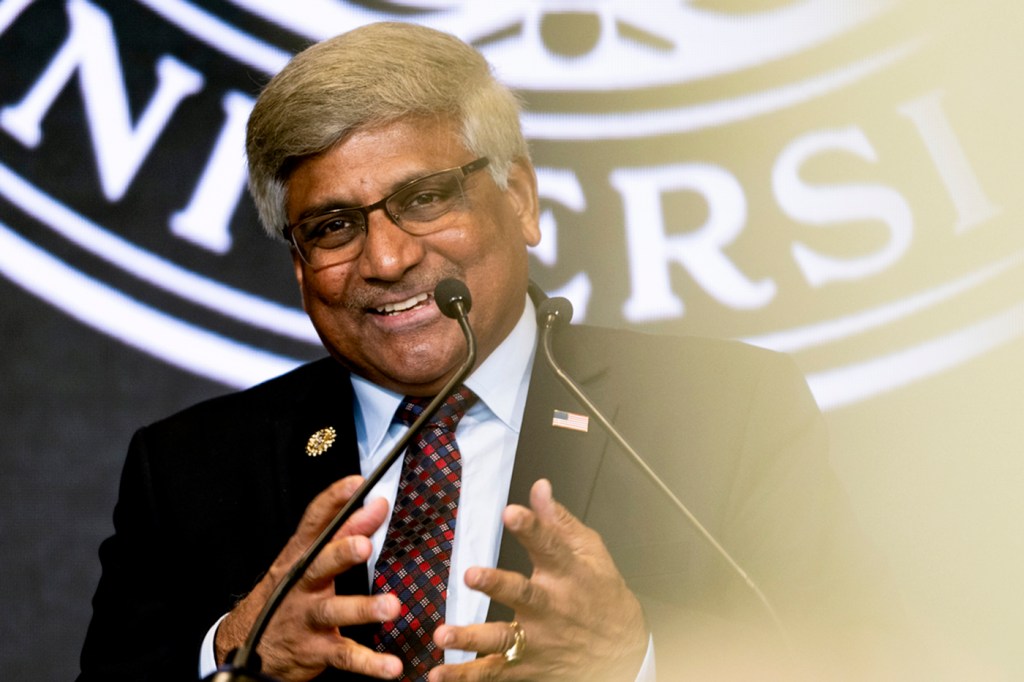National Science Foundation director to speak at Northeastern’s 2024 graduate commencement at Fenway Park
Sethuraman Panchanathan is no stranger to Northeastern University. He spoke at the grand opening of the EXP research center on Northeastern’s Boston campus in the fall.

National Science Foundation Director Sethuraman Panchanathan will be the speaker at Northeastern University’s 2024 graduate student commencement.
The ceremony will take place at 10 a.m. on Sunday, May 5, at Fenway Park in Boston. The undergraduate ceremony will be held at 4 p.m.
Panchanathan, a computer scientist and engineer, was named director of the National Science Foundation in June 2020. The NSF, which has a budget of about $9.5 billion, is an independent federal agency charged with advancing scientific discovery, technological innovation and STEM education in the United States.
“Many of the greatest challenges of our time pose questions that only science can answer,” said Joseph E. Aoun, president of Northeastern. “The unrelenting quest to solve global problems is powered by the brilliant minds of scientists and the unwavering support of federal agencies like the NSF. Director Panchanathan’s leadership has been a force in recognizing the groundbreaking challenges and opportunities of cutting-edge science, particularly artificial intelligence. We welcome him back to Northeastern.”
Featured Posts
Panchanathan is no stranger to Northeastern. He spoke at the grand opening of Northeastern’s 357,000-square-foot EXP research complex on the university’s Boston campus in the fall.
“I had a fantastic opportunity to visit Northeastern University for the grand opening of the EXP research complex last October,” Panchanathan said. “I saw firsthand how dedicated Northeastern University is to providing world class educational opportunities and to training future generations of leaders and innovators.”
“I’m sincerely delighted to be returning to Northeastern University in May to celebrate this year’s graduates. Their Northeastern education has given them everything they need to succeed in a future that is rich with opportunities,” he said.
In an editorial in the scientific journal PNAS Nexus last month, Panchanathan called for the responsible and equitable development of artificial intelligence. He said the NSF annually spends about $800 million on AI research in the public interest. In January, NSF, other federal agencies and private sector partners launched the National Artificial Intelligence Research Resource pilot, a first step toward shared national research infrastructure.
“Responsibly democratizing AI research will cultivate an environment where innovation happens anywhere, and opportunities are available everywhere,” he said in the editorial. Panchanathan told Northeastern Global News in October that there may be challenges in regard to artificial intelligence but the promise of innovation cannot be slowed because of the potential.
“The challenges should motivate us, inspire us, to see what kinds of guardrails, what kinds of new technologies, what kind of innovations can be developed to address them,” Panchanathan said. “We don’t walk away from challenges. We don’t shy away from challenges. We understand them, we configure them. This is the time I would say to speed up rather than slow down.”
Prior to his confirmation as NSF director, Panchanathan served as executive vice president of the Arizona State University Knowledge Enterprise and the chief research and innovation officer. He was also the founder and director of the Center for Cognitive Ubiquitous Computing at ASU. Panchanathan was previously a professor at Arizona State for many years.
Panchanathan’s work in science has advanced the areas of human-centered multimedia computing, haptic user interfaces and ubiquitous computing technologies for enhancing the quality of life for individuals with different abilities; machine learning for multimedia applications; and media processor designs.
Panchanathan earned a Ph.D. in computer and electrical engineering from the University of Ottawa. He also has a master’s degree in electrical engineering from the Indian Institutes of Technology, a bachelor’s in engineering from the Indian Institute of Science and a bachelor’s degree in physics from the University of Madras.
The procession for the graduate student commencement will begin at 8:30 a.m. The ceremony, which will be livestreamed, will take place at historic Fenway Park, located a short distance from Northeastern’s Boston campus. Each year, nearly 25,000 students, families and friends gather at the event to celebrate the culmination of achievements and experiences in the classroom and around the world. As part of the university’s renowned experiential learning programs, Northeastern students work, study and conduct research in 149 countries and on every continent.
The graduate students at this year’s commencement ceremony hail from 99 countries. They will have earned degrees across multiple disciplines, including computer science, engineering, health and business. Upon graduation, they will join a global network of more than 300,000 alumni who live and work in 181 countries.
The graduate commencement will include Boston campus candidates for master’s degrees and doctorates. Commencements will also be held for Northeastern’s global network of campuses, the law school, Ph.D. graduates and College of Professional Studies, in addition to celebrations by each of the university’s colleges.











